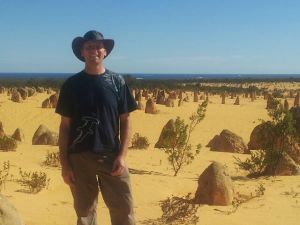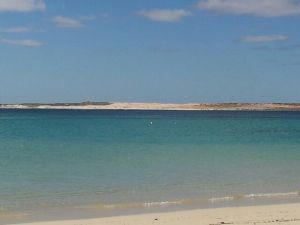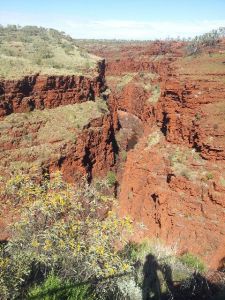What makes human people special? In this context, what makes us stand out from the rest of nature? Why don’t we see ourselves as part of the rest of life on earth? This came up for me recently, as i listened to an Australian Aboriginal lady explain that her people should be thought of that way; that they were part of the flora and fauna of the land, in terms familiar to deep ecology. What was kind of shocking here was the fact that such an argument was once used by early colonists of this country to justify dispossession and settlement. It was allied with the idea of Terra Nullius; there is no real society here, recognisable to European standards, so we can simply take the land. Those black fellas are part of the land – so, no barrier to our possession of it. They literally branded Aboriginal societies as part of the flora and fauna, but meant something very different, and much more horrible, by the same sentiment.
 The author at The Pinnacles, Western Australia. Standing amongst the rocks, not independent of them.
The author at The Pinnacles, Western Australia. Standing amongst the rocks, not independent of them.
A similar conundrum faces us when we align the feminine with nature; or with the darkness, or the deep waters of emotion. It’s not that the analogy is wrong – it’s the negative associations commonly held with the imagery that leads to problems. It’s easy to see why the feminine and nature are so easily aligned – we are birthed out of both, the womb of our mother and the matrix of the universe, physical matter itself. Likewise with the easy metaphorical association between the feminine and darkness; the mysterious ways of the world, the intuitive mind that women seem so often more comfortable with, compared to the ‘daylight’ or rational consciousness that has just as often been associated with the masculine spirit, and men in general.
 The sea, here at a beach in Shark Bay, WA. That sense of oceanic awareness, which Freud resisted and Jung identified with … the great eternal feminine, the Tao of universal flow
The sea, here at a beach in Shark Bay, WA. That sense of oceanic awareness, which Freud resisted and Jung identified with … the great eternal feminine, the Tao of universal flow
If we were more comfortable with the darkness, with mystery, with the earth as our greater body, we could embrace these associations. We are suspicious of them because they are so often used to denigrate – to assume mastery over them, to remove ourselves from identification with them, to be independent and to feel powerful. It’s an illusion, just as the intuitive sense of them probably is too. Ultimately, matter and intuition could be thought of as masculine, abstract thought and logic as feminine, in a different social order. The moon has been considered masculine in Aboriginal and Mesopotamian cultures, which throws the whole European system out of order; in ancient Sumer, Nanna was the Moon God, a great bull looking over the herds of feminine stars. Symbols are flexible, no matter how true they seem to us. They are part of our consciousness, part of our mythology, so we accept them, just as we accept scientific thinking and the mundane materialism of commercial life in the 21st century.
 The spectacular gorges of Karijini NP, Pilbara region of WA. A sense of timeless pervades the landscape here, where rocks have been weathered for millions of years
The spectacular gorges of Karijini NP, Pilbara region of WA. A sense of timeless pervades the landscape here, where rocks have been weathered for millions of years
I’d love to be thought of as part of the flora and fauna. I don’t want to assume mastery over the world and differentiate myself from it as part of some patriarchal fantasy of ‘civilisation.’ I’m just as comfortable with the feminine, nature, mystery and darkness as with the masculine, mind, a sense of certainty or logic and light – and i know that these systems of thought are all fluid, as sure as my sense of self and society and just as contingent upon history and environment as any other way of thinking. But i don’t want that to be an invitation to be defined as passive, as part of the land to be used and abused, as a walkover for free market assumptions that reduce everything to what they are worth at the current exchange rate, either. I stand with that Aboriginal lady – and support the positive connotations of her stance, just as i resist the way it can be turned upon her – and upon us. People of the earth, unite.
Very insightful and thought provoking. What if Deity’s perspective is similar to the way I look at my own children and grandchildren? I want them to explore and create and rebel, to learn life lessons, and make mistakes. I don’t worry when they become snarky teens who never want to spend time with the old man because I know they’ll come back when they’re more mature, apologizing and asking for my advice and wisdom. I hope humanity is a rebellious teen on the verge of coming home to learn from Mother Nature…back to cave, well, and womb to be silent and face our shadow selves, emerging wiser, prepared to grow, evolve, and transform.
LikeLike
Hi Robert, thanks for the comment and question. It partly depends on what you think of when you use the term deity. I don’t use it, but sense you may mean something not unlike the way i think of universal consciousness, or the idea that it pervades all things with an implicate order, which includes the destruction and death sometimes experienced at the mortal level as chaos and darkness. Either way, the idea that society is at the stage of the rebellious teen seems appropriate, to me, when i think of modernity, technology, the global free market civilisation (and especially the resource depletion and ecological destruction that comes with them). But i’d like to add that many societies have and still do experience life on this planet from a perspective of deep wisdom, of patient knowledge of earth cycles, of knowing to ask advice of their elders and ancestors … Aboriginal Australians, like Native Americans and many other minority cultures, continue to keep these ways alive, in spite of shocking living conditions and tortuous histories of genocidal dispossession. I’m not romanticising them but asking that we moderns think of them as elders – as, in this global view from the perspective of deep history, we are the teens and they the wise ones. Having said that, it will take a combined effort, using the best of modern science as well as ancient knowledge (and i would add the keys of self-awareness, including mystic insight and mindful psychology), for the human race to create the just, ecologically sustainable world it is capable of. At least, that’s what i find when i look into that well, cave and/or womb you mention.
LikeLike